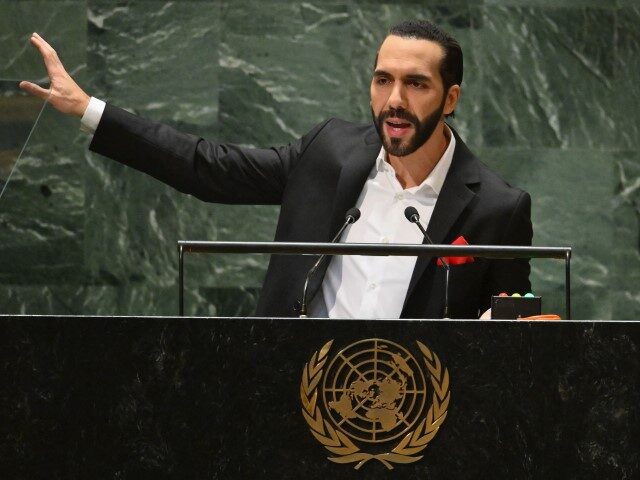Nayib Bukele, the president of El Salvador, used his address to the United Nations General Assembly on Tuesday evening to assert his country’s “right to be correct” on how to eliminate crime – and tell detractors that his policies against gang violence have been a “resounding success.”
Bukele has attracted widespread international attention since his ascent to the presidency of his country in 2019, when he vowed to use the executive to eradicate decades of violent crime committed by members of the nation’s powerful gangs, most prominently the Mara Salvatrucha (MS-13) and the 18th Street gangs.
Bukele used his powers to launch nationwide raids and imprison tens of thousands of suspected gang members, erecting “mega-prisons” to house them and empowering law enforcement to detain suspects for the long term.
Presidency of the Republic of El Salvador via StoryfulTo do so, Bukele required the support of Congress, which his New Ideas Party took over in 2021. That Congress then replaced the entire Supreme Court makeup and the nation’s attorney general, and subsequently approved a “state of exception,” a constitutional exercise that imposes a state similar to martial law, in March 2022, limiting the constitutional rights of freedom of association.
Some Western human rights activists and governments, such as that of leftist American President Joe Biden, have aggressively criticized Bukele’s anti-gang policy, accusing him of violating the due process of suspected criminals and unlawfully extending the emergency “state of exception” which limits freedom of association. Even critics have conceded, however, that rampant gang violence in El Salvador has largely disappeared since Bukele began his campaign, expanding the freedom of association for civilians who can now enjoy public parks in peace or start small businesses without paying bribes to gang leaders.
“The gangs do not exist in this moment as El Salvador knew them for decades,” El Faro, a Salvadoran newspaper that has consistently criticized Bukele on human rights grounds, reported in February.
“No one even dares to deny that, for the first time in its 202 years of history, the smallest country on the continent has taken its first great steps to achieve its dream of greatness,” Bukele told the General Assembly on Tuesday. “In very little time, El Salvador went from being the world capital of homicides – it went from being literally the most dangerous country in the world – to being the safest country in Latin America.”
Bukele’s speech on Tuesday was significantly different in tone to others he has delivered at the platform – unique among his General Assembly addresses in that he did not take a moment to disparage the Assembly or the United Nations generally as “obsolete” or “irrelevant.” He also omitted mention of his commitment to bitcoin, which he has previously touted as the path to economic prosperity for his country but which has largely failed. Instead, he focused on his elimination of the gangs, which he declared a “resounding success.”
Today El Salvador competes with Canada to be the safest country on the continent.
“People can walk down the streets that for a long time they were banned from by the gangs. Businesses don’t pay extortion fees anymore, and children can go play in parks without fear of being recruited or killed,” Bukele asserted. “These are things that to many of you may sound basic or everyday, but in my country did not exist.”
“Intellectuals, journalists, politicians, and organizations from everywhere became entrenched in a debate over what we were doing. Today I come to tell you: that debate is over,” he continued. “The decisions we made were right. We are no longer the world capital of death and we achieved this in very little time.”
The president credited his success in large part to ignoring the international community. He advised other nations struggling with development to “make their own decisions” and “make their sovereignty count.”
Countries must “reaffirm their right to use common sense, try their own recipes, execute their own plans, design their own systems,” he suggested. “No country has a right to impose their ideas, to impose their way of doing things, especially when they don’t even work in our countries.”
Regarding violence at home, Bukele said, “the efforts that we were making to improve health or the economy were little useful if they kept killing people and judges and prosecutors freed the killers.”
“Transforming education was little useful if through the prisons themselves, gangs gave orders to kill in a cowardly manner our childhood and forcibly recruit our youth,” he continued.
“So we made the decision to overhaul the prosecutors’ offices, the judicial branch, and the prison system. We also changed the laws to ensure that terrorists would not be freed from jail again,” he explained. “And that was the moment where the international condemnations began. Some countries, some media, and some ‘experts’ began a systematic attack against every one of the decisions that we made.”
“Doesn’t it seem absurd to you for us to be questioned over this?” he asserted.
Bukele concluded with the hope of reversing the “mass exodus of Salvadorans” and “reach inverse migration.”
“El Salvador is being reborn because we dared to challenge ourselves and decided that nothing and no one would tell us what to do,” the president said.

COMMENTS
Please let us know if you're having issues with commenting.